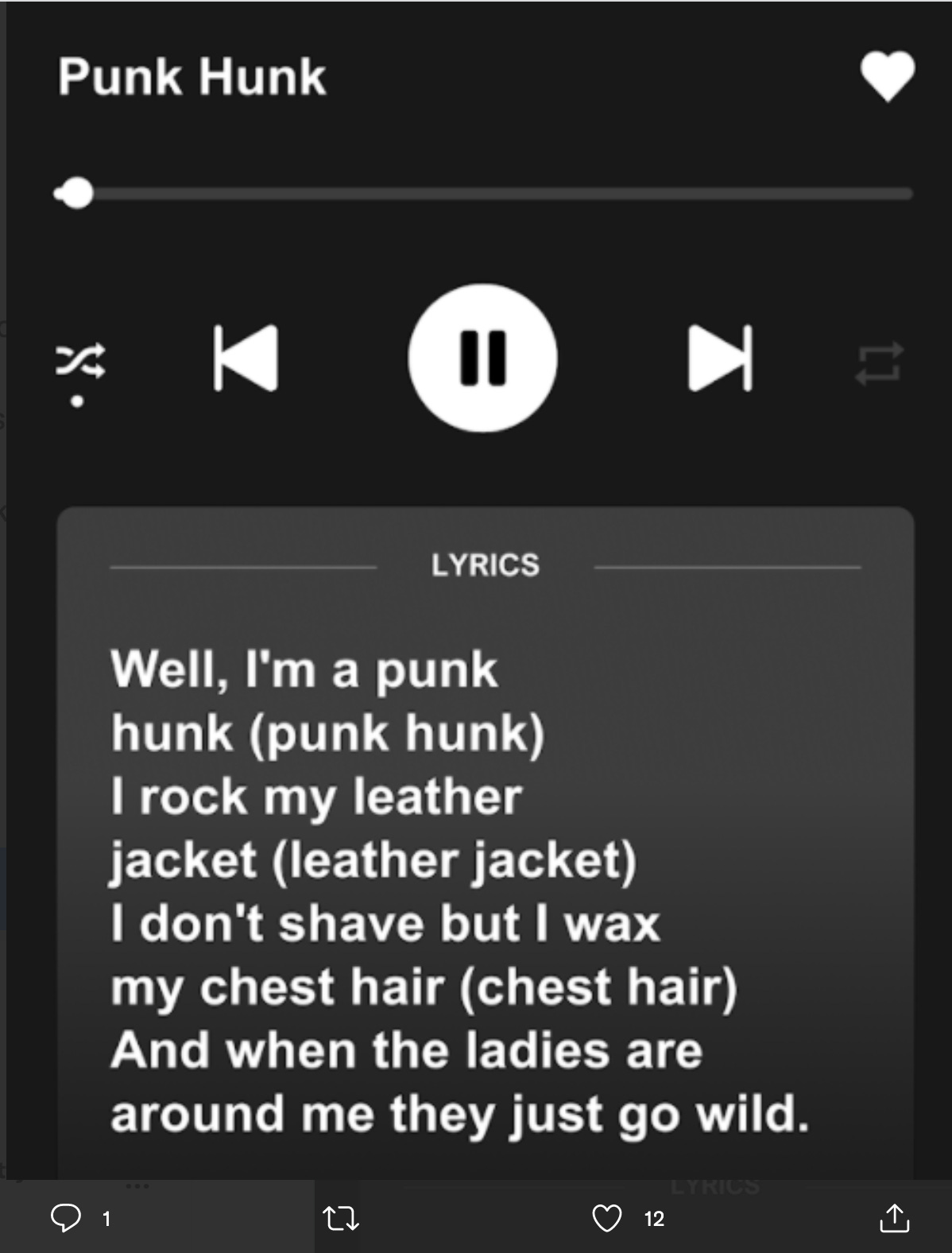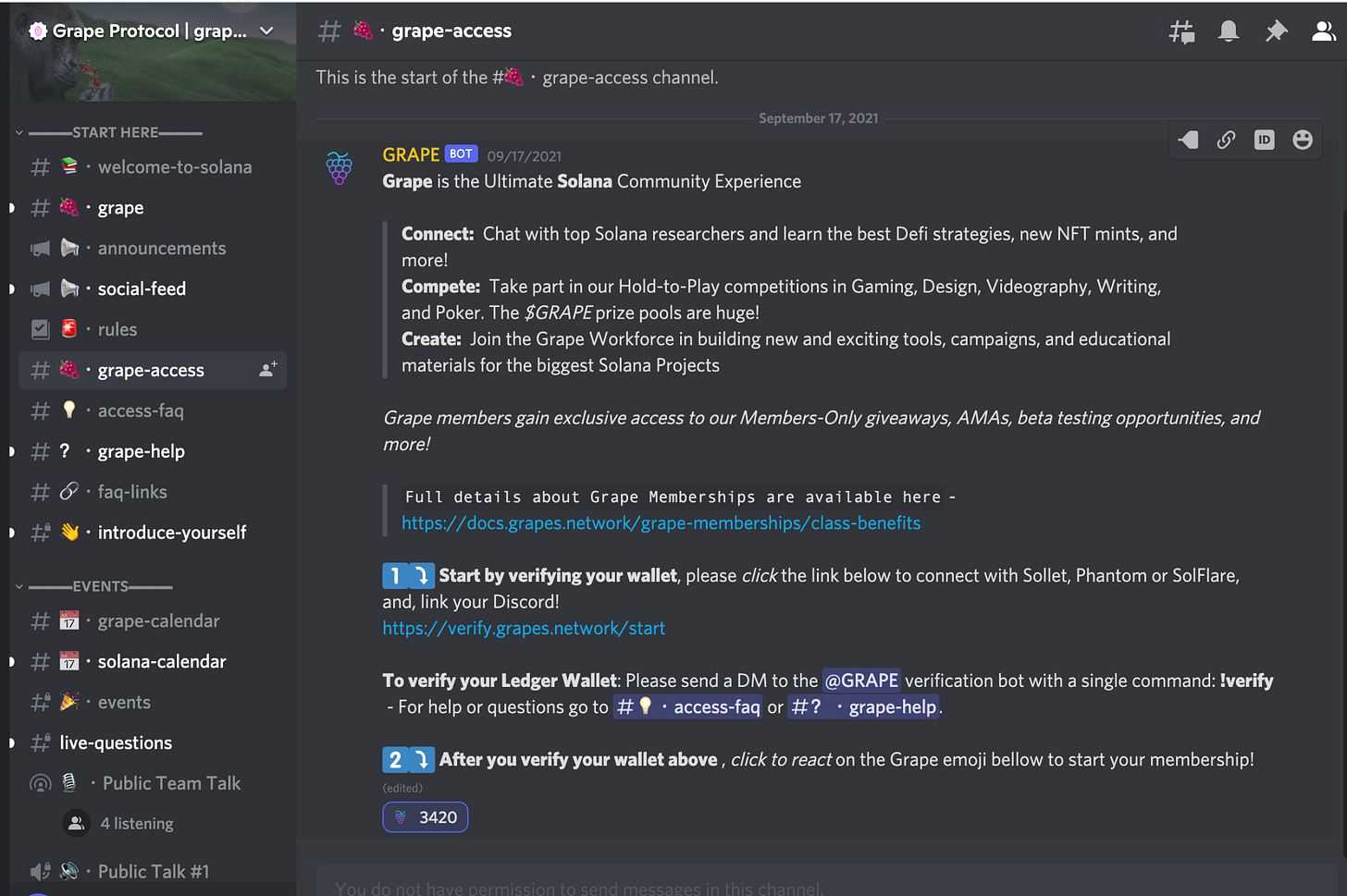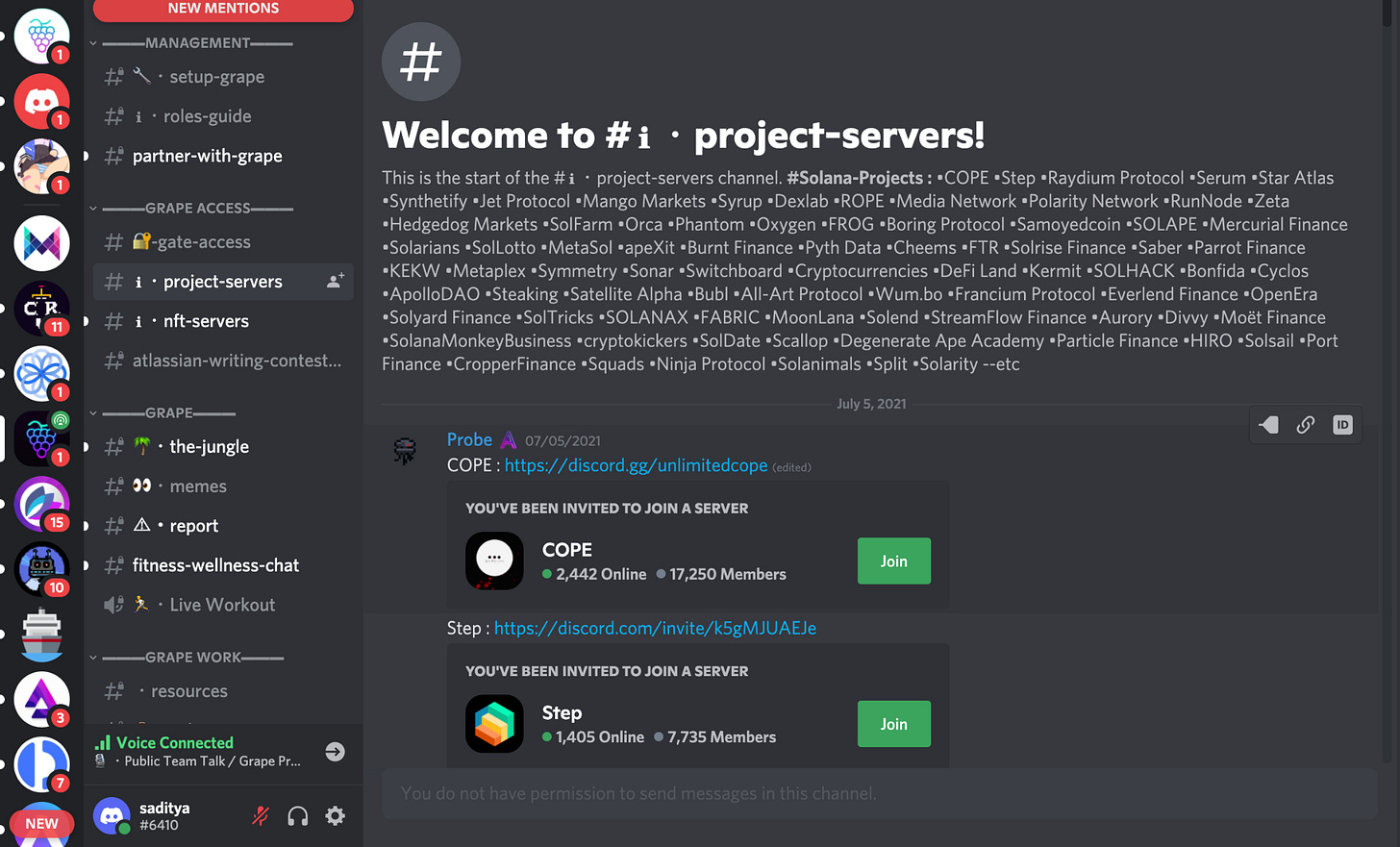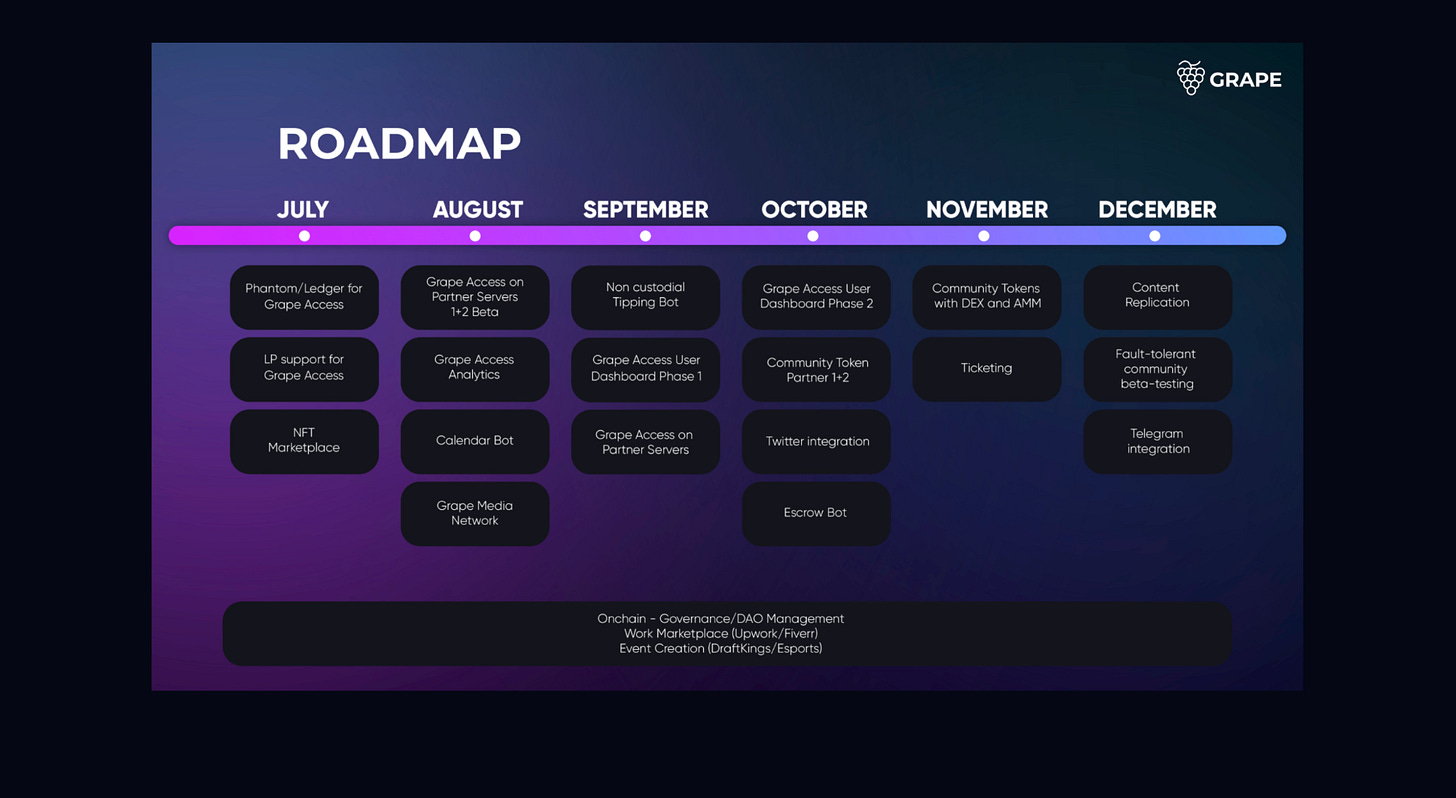Web3, Communities & The Grape Protocol
This post won runners up at the SuperTeam bounty on grape. This version has some edits based on feedback from the submission. You can find the winning entry on the Superteam substack or the author’s medium. The other runner up entry is here. You can find more bounties here
Introduction
When I saw a tweet from super team putting out a bounty for reviewing a decentralised social networking product - I expected to land on a website like Bitclout, possibly with a better UI & sizzle given this was on the Solana chain. But when I landed on the grape protocol webpage there was no “feed” or no “post” button - after 5 minutes of stumbling around I decided to go down the rabbithole.
Today, Grape is a protocol that enables social communities to create layers of access, controlled by ownership of a particular token/NFT. Before we go into why this is awesome, let's take a step back and understand the role of communities in crypto/web3. You can skip the next bit if you’re already into it.
Web3 & the power of communities
If we look back at the last 100 years, the process of people collaborating on projects is evolving faster than ever:
Pre- internet (before ~2000): you needed access to significant capital, real estate, machinery
Web2 : ability to code + servers, i.e. the era of billion $$ companies starting in garages
Web3 : web2^(community)
The biggest change in the post internet companies(#2) is that they grew really fast compared to their previous counterparts, because once it reached a certain scale, the internet made distribution really cheap and instant. They also distributed wealth significantly better among employees, presumably because unlike traditional companies the asset was not just the land or the material but also the ability of people to create great products
Mark Zuckerberg once said that they had never planned to start facebook as a company. They just loved working on it - and eventually figured out that a company was the best tool to enable collaboration among a lot of people who want to work on a shared vision. And this makes sense, companies solve the following problems -
Trust & Identity : You naturally trust everyone in the company because you’ve all signed a contract to work towards common goals
Leverage: There’s a reason instagram stories was bigger than snapchat the day it launched, big tech companies build on top of the massive scale they’ve already acquired. This applies to all things like hiring, brand, software, cross-subsiding initiatives etc
Access to capital: Companies can raise money from private and public markets in ways that other “groups” can’t.
However, once you think about companies as a tool to achieving a goal and not the goal - it opens you up to the possibility that companies can get better, or get disrupted. Here are some areas of improvement:
Asymmetry : The company has way more power and information compared to any individual employee. This reflects in decisions around compensation, equity allocation/vesting/liquidity preferences, performance reviews and strategic decisions.
Silos & Switching cost: You can work only at one company at a time & companies deliberately make entry and exit costs high with things like high notice periods, non-compete clauses, pedigree requirements etc.
Organisational Overhead: As companies scale - several layers of management are created & at the very least individuals need to work around these to get things done.
Geo: Setting up shop in a new market for a company requires overhead which restricts access to global talent.
So - how does cryptos + coins/tokens + communities make this better?
Permissionless: Anybody can join or leave, you can also be part of & contribute to multiple communities
Ownership & financial incentives baked in: Tokens represent ownership, communities can give tokens to people who are taking positive actions
Transparent: To gain trust and traction, the early founders need to over-communicate key decisions and publish them to a blockchain. All changes are public and recorded. Eventually community governance kicks in.
Ofcourse, these are far from perfect yet and there’s a LOT that needs to be improved for this model to achieve the scale and impact that big tech has achieved.
Few challenges with communities so far:
Decision making & ownership: if everyone owns it then no one owns it - communities need to find ways to incentivise people to work towards growing and building them.
Classic marketplace problem:
If you want serious and skilled folks to work for communities - you need a consistent supply of quality work.
If you want a good supply of work, you need a ready set of people who’ll pick it up
Connecting with the traditional world: Interfaces which allow their products and work to seamlessly work with traditional finance, businesses and society. Centralised exchanges which allow you to convert fiat to crypto and back are one such example.
Scams: Given how early it is - a lot of communities are simply organised around pumping up a token and passing it on to the next sucker. Hopefully these will fizzle out and the many good ones will stand the test of time
[This would be a good point to checkout the glossary for the definition of some frequently used terms]
With that context, I want to share an example of a recent community I joined - The Tunes Project*. With NFTs being all the rage, I was curious when I saw a tweet from Suhail Doshi saying he is launching an NFT. He’s already quite successful - so if he is putting his name and time into it - there must be some value. I jumped into their discord.
(*Disclaimer: Before we proceed - this is not investment advice to buy tunes or their derivatives. I personally hold a few. Please do your own research. All references to tunes are simply my personal opinions from being a part of the community - and may not represent views of the community overall)
There was a lot of excitement around the price. And a lot of NFT communities possibly start off like that - early buyers pumping the project to push the price up and exit. This too had some of that but the real intent was to create a community of music lovers and builders who had full ownership of their work. The first drop (inspired by Loot) was just an AI generated song title - do what you want with it. This is where the magic started.
Here’s what the first drop of Tunes looked like -
A guy named Rohan started making epic AI generated cover art for everyone - eventually he got so many pings that he set up a bot. Within barely 2-3 weeks the project has:
A gallery to browse cover art
A protocol to attach art to the original tune on the chain
A derivative to add songs & remixes
A player to listen to songs
A derivative to add visual tracks
Cover Art from the song name
Vision for the project
Lyrics for songs
And there’s a lot more coming….
For this project to scale like the big tech companies did, a few questions need to be answered,
How can the Tunes Project reward folks doing good work?
How can they prevent spam?
How can they enable collaboration & make decisions about the future of the project?
How can they get more people in and go even bigger?
Earlier, the obvious answer was - form a company, appoint a CEO, raise funding etc. But now, there’s a potentially better option available. Now - Protocols like Grape enable a community to reward good behaviour & verify your stake in a community before giving you access.
Communities can gate access to proof of stake (token). They can grant stake to people they want to let in. Different from a company: entry and exit cost is low.
A natural question at this point is - but why do you need a token for all this? Just organise a community and use traditional institutes for managing money and paperwork. This doesn’t work because the final layer of enforcement (i.e. the bank account) will necessarily have to be controlled by a few individuals (signatories), and will be susceptible to power grabbing, censorship, fraud etc.
The rest of this post will now deepdive into the grape protocol.
Concept Note - How does Grape work?
Just to be clear - grape is not a social network in and of itself (like facebook or bitclout) - it is a tool which enables any social network to verify and incentivise good behaviour. Today - grape supports discord communities and is built on the solana chain. They will add more social networks and bridges in time.
In their own words, “Grape Network’s tools help decentralized communities coordinate members, communication, work, and incentives. By layering blockchain solutions on top of systems users already love, we are providing value to users today, while simultaneously preparing them for the new interactions of the crypto future”
Let’s take the example of the same Tunes Project I’d mentioned above, as early members of the community - you’d want the following,
The grape protocol enables all the actions ( & more) listed in the table above. In the next section we’ll deepdive into exactly how this works.
The Grape Community
Get access in a grape enabled token-gated community
Today, the grape protocol supports only discord. So, let’s say you’ve landed on a discord server of a community you find interesting (for our example - the grape discord community)
The Access Channel
You’ll see a channel called “grape-access” which has the process to verify a Solana wallet.
If you don’t have one I’d recommend using a Phantom wallet - super easy to set up with great UX. There’s a good snippet in this post you can use to learn more about it.
After you click on the link you’ll be asked to authorize the grape protocol to access your wallet and be told exactly what it can and can’t do.
Once you click approve, the Phantom wallet will ask you to “sign” or approve the request as a final step.
Once you do this you’ll be redirected back to the discord group and then you just need to click on the grape emoji to open up the first level of access
Worth noting - you need 0 SOL in your wallet to do this.
The Access channel with steps on how to verify a wallet
Phantom wallet telling you exactly what you’re giving access too
Final confirmation to authorise access
You’ll be redirected back to discord and will need to click on this emoji to get the first level of access
After doing this i’m granted a “verified” wallet” role giving me access to read and post in selected channels
For reference, here’s what a core team members access would look like (just picked this up from their discord at random)
Contribute to Grape
The Grape Protocol has created many roles to make it intuitive for members to contribute to the community. You can find these in the “roles-guide” channel. You will need to hold at least 5000 GRAPE Token to get a role. Alternatively, you could contribute by participating in bounties, like this one :)
The spirit of these is to organise and incentivise skilled members of the community to invest time and energy in contributing to the quality of the product, growth, marketing etc - kind of a like a company but way more loosely coupled.
You can checkout the “work-requests” channel to find specific areas to contribute
Setup grape for your community
If you run a discord community with a SOL token/NFT you can get token gated access levels by checking out the “setup-grape” discord channel and filling out this form (depending on when you read this - please check the channel for the latest link - this one will not be updated)
We won’t go too deep into this because, if you’re running a community - you’re best off just going through the form and posting questions on the grape channels
Here’s a list of some of the projects that are using the grape protocol to access control
Here’s how you get access to restricted channels of any of these projects. I currently don’t have any of these tokens, so I’m not going to show you what happens when you get them and verify - but I can assure you that clicking all emojis without the tokens doesn’t work. You can swap these tokens using apps like symmetry.fi - more info on that in the same post i’d mentioned earlier
Chilling out @ Grape
There’s a lot the team is doing to keep the community engaged - live workouts, games, AMAs & town halls etc. And yes - they have a memes channel.
Product & Key Features
The first product the team has launched & the one we just saw is called “Grape Access”. Apart from the features we went through, here are a few other features I found on their website which are worth noting -
Multi-coin: Any Solana token can be used to define membership and roles
Moderation-free: Memberships automatically adjust based on “stake” rules
Restoration:
Because roles are persisted on the Solana chain, even if the community is destroyed (e.g. Discord bans you or gets banned) - you can recreate the group with the roles intact on any social media platform.
The risk of-course is if the Solana chain gets taken down - you would probably end up losing the source of truth.
Usage statistics : aggregate and user verifiable
GRAPE DAO: Token holders can apply to become members of the DAO or any of the focused sub-DAOs
Grape Access: We’ve already covered this.
The Grape Dashboard
You can find it here. You will need to connect a phantom wallet, the process is similar to what we showed in the Grape community section. This gives you a unified dashboard to see:
Tokens/NFTs you hold
Grape Gated Communities that you are a part of
Discover new communities and register (switch to “ALL” on the servers widget)
Link your social account - discord (today)
Roadmap
Access is just the first product, the community seems committed to adding more use cases (tipping), more analytics, and more social networks (telegram) . Here’s a snapshot of the roadmap from their website
The Grape Token
There’s a really good snippet on the role of tokens in communities in this post.
Basically tokens can be used to provide ownership of the project along with privileges (e.g. applying for work) , and access to governance decisions. Here’s a snapshot of the idea behind the grape token
The Grape DAO
The early community has chosen to organise as a DAO - which means token holders decide the future and direction. You can apply to be a part of the DAO once you meet certain criteria. They’re further organised into Sub-DAOs which focus on specific areas. Here’s a snapshot from their official docs
Similar Product - Collab Land
Obviously, GRAPE isn’t the only community doing this. Here’s a similar product, one I stumbled upon in the Tunes project - Collab Land
The Tunes Project used it to create a channel dedicated for holders. I went through a 3 step process to get verified
I was already in the community, so I just typed in the “bot command”
Linked my Metamask walled (since this was on ETH)
Got access to the holders channel
Similar to Grape Access, it also allows creating multiple roles based on ownership
Conclusion
Grape is proving to play two key functions on the Solana ecosystem
Becoming a strong community for members across multiple DAOs to collaborate, recruit, chill etc. Everyone demonstrates some proof of stake before getting access.
Building critical infrastructure for DAOs on Solana to operate more effectively
Glossary & Links
Token: A digital asset used to transact or prove ownership on a web3 protocol
Crypto Wallet: Your gateway to transact on web3 - store & swap tokens
Non fungible token (NFT) : Similar to tokens (#3) but not interchangeable e.g. all bitcoin are worth the same as each other - doesn’t matter which one you have, but all Crypto Punks aren’t worth the same
Proof of stake: Power to operate a decentralised network by proving you hold a certain amount of their tokens. More info here
Smart Contracts: Any software that executes based on certain conditions being met by anyone operating on that blockchain.
DAOs : A group of people who collaborate on projects/ideas and execute decisions via some form of smart contracts. More info here





















